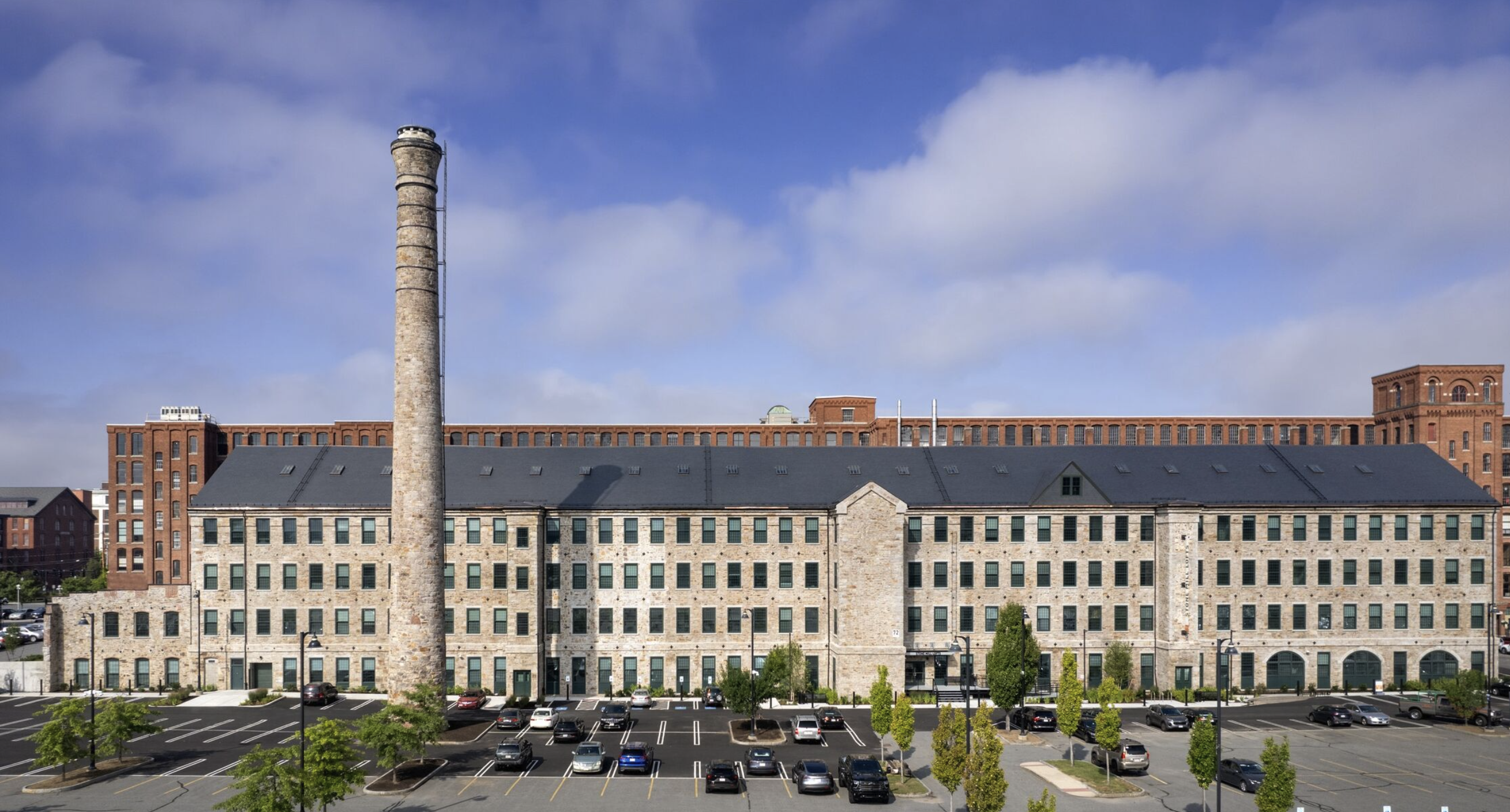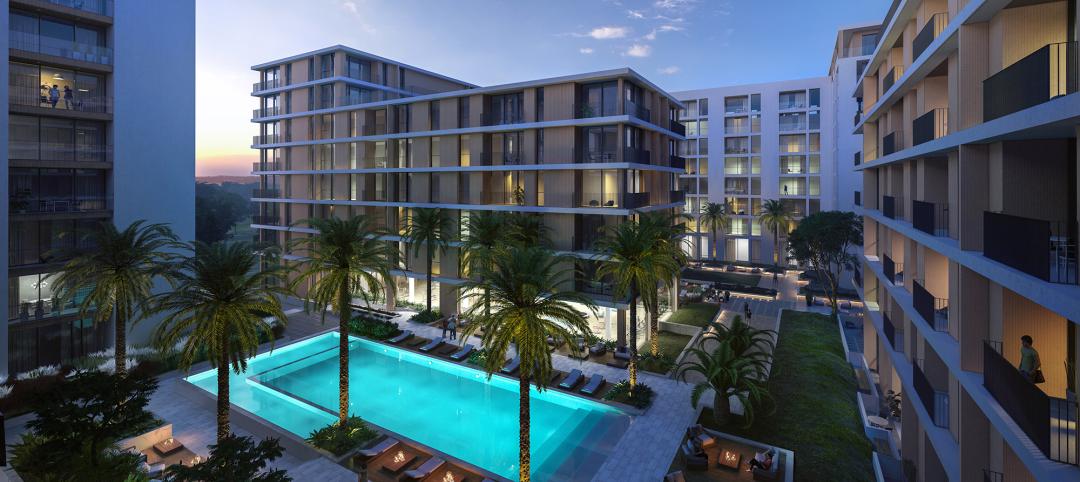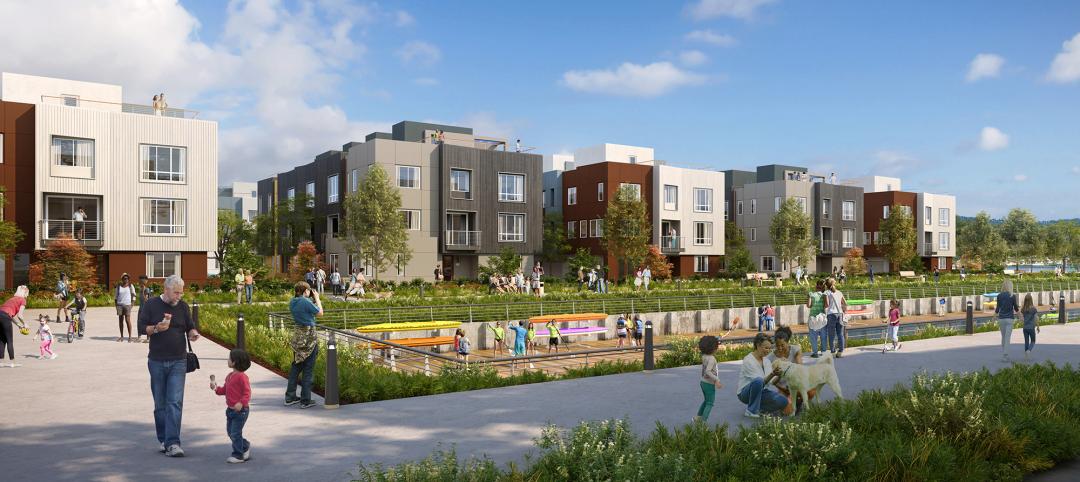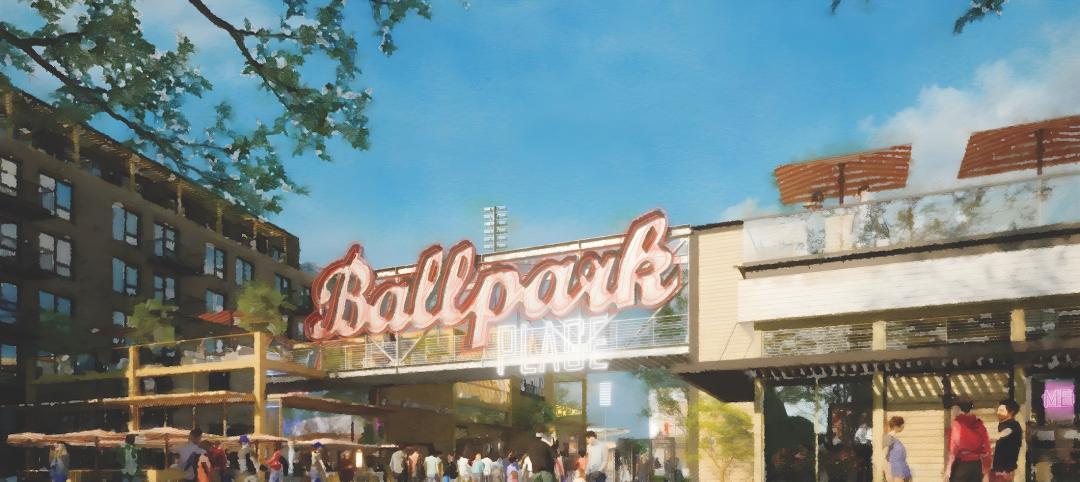A recently opened multifamily property in Lawrence, Mass., is an adaptive reuse of an 1840s-era mill building. Stone Mill Lofts is one of the first all-electric mixed-income multifamily properties in Massachusetts. The all-electric building meets ambitious modern energy codes and stringent National Park Service historic preservation guidelines.
The $39.2 million project transformed the oldest mill in Lawrence, a former industrial powerhouse, into 86 units of rental housing. An airtight, ultra-efficient building envelope includes the use of substantial insulation, high-performance historic replica windows, high-efficiency heat pumps, and energy recovery systems. The development’s fossil-fuel-free design is expected to use 46% less energy and result in greenhouse gas emissions reductions of an estimated 33% compared to a typical apartment building.
Fifty-eight apartments are intended for households earning up to 60% of Area Median Income (AMI), 11 apartments are for those earning up to 30% AMI, and 17 units will be leased at market rates. The 149,220 sf complex was constructed between 1845 and 1848, harnessing the Merrimack River to manufacture tools, mill machinery, water turbines, and millwork for textile factories.
The building team preserved the structure’s unique historic characteristics while installing four inches of insulation and high-performance, historic replica windows, making highly efficient electric building mechanical systems feasible. “We believe Stone Mill Lofts is one of the most significant projects to result from our longstanding partnership with WinnDevelopment because it sets a new standard for how historic preservation and adaptive reuse can address the affordable housing crisis and climate change at the same time,” said Scott Maenpaa, TAT project manager.
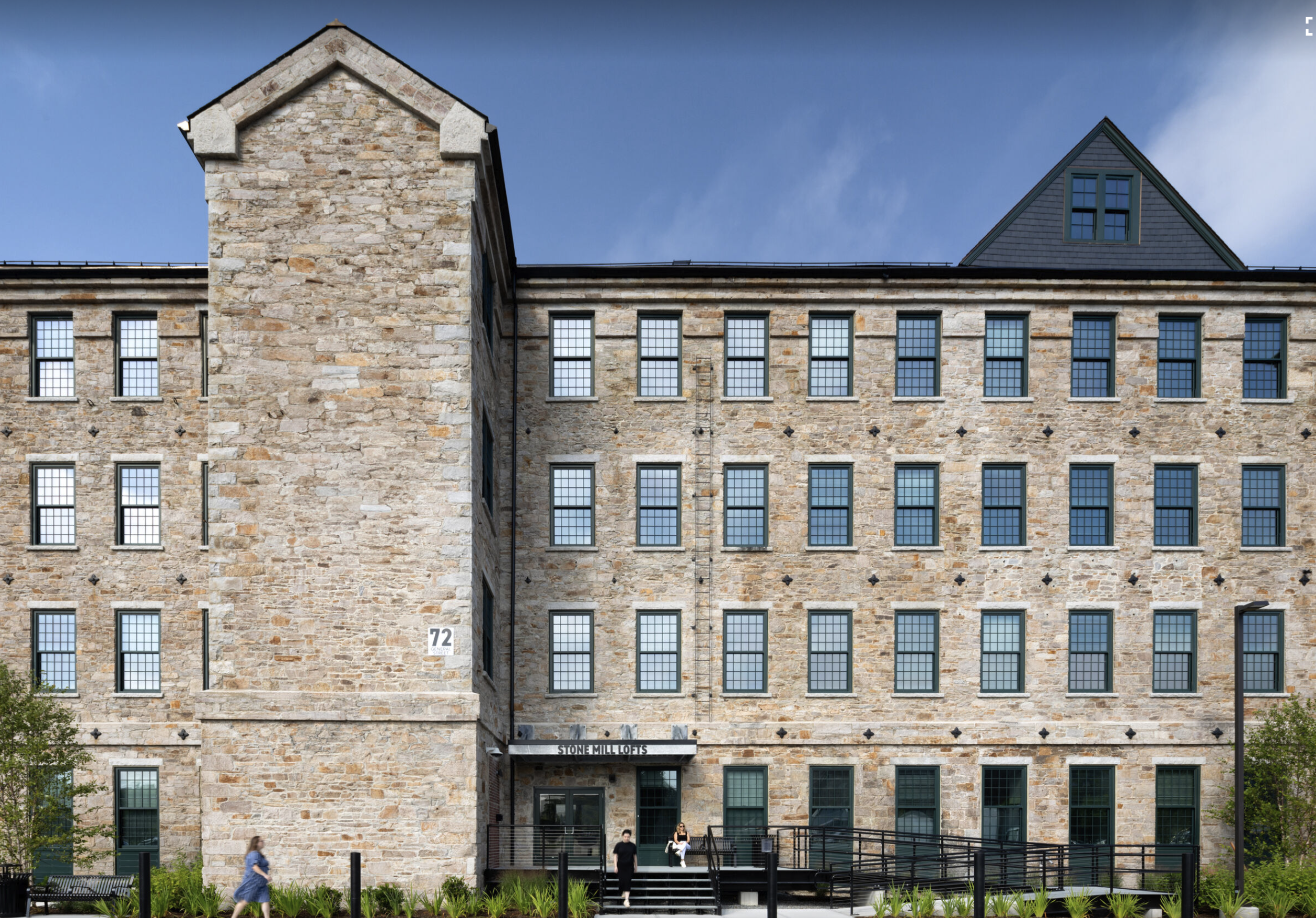
Stone Mill Lofts offers 50 one-bedroom apartments, 28 two-bedroom two-bath units, and eight three-bedroom two-bath units. Every apartment benefits from large window openings and the thoughtful integration of existing historic elements such as exposed, original wood beam ceilings.
On-site amenities include an expansive resident lounge and kitchen, billiards room, a fitness center with interactive equipment and a yoga nook, a children’s playroom, indoor and secure bicycle parking, resident storage lockers, work-from-home pods, secure package room, a historic mill exhibit room, nicely landscaped outdoor areas, and a patio. The 2.3-acre site is located within walking distance of a commuter rail line to Boston.
The Massachusetts Executive Office of Housing & Livable Communities contributed $3.1 million from the Affordable Housing Trust and Housing Stabilization Funds. The project also benefited from more than $38 million in Federal and State Low Income Housing Tax Credit equity and Federal and State Historic Tax Credit equity.
Owner and/or developer: WinnCompanies
Design architect: The Architectural Team, Inc. (TAT)
Architect of record: The Architectural Team, Inc. (TAT)
MEP engineer: R.W. Sullivan Engineering
Structural engineer: Odeh Engineers/WSP
General contractor/construction manager: Keith Construction, Inc.
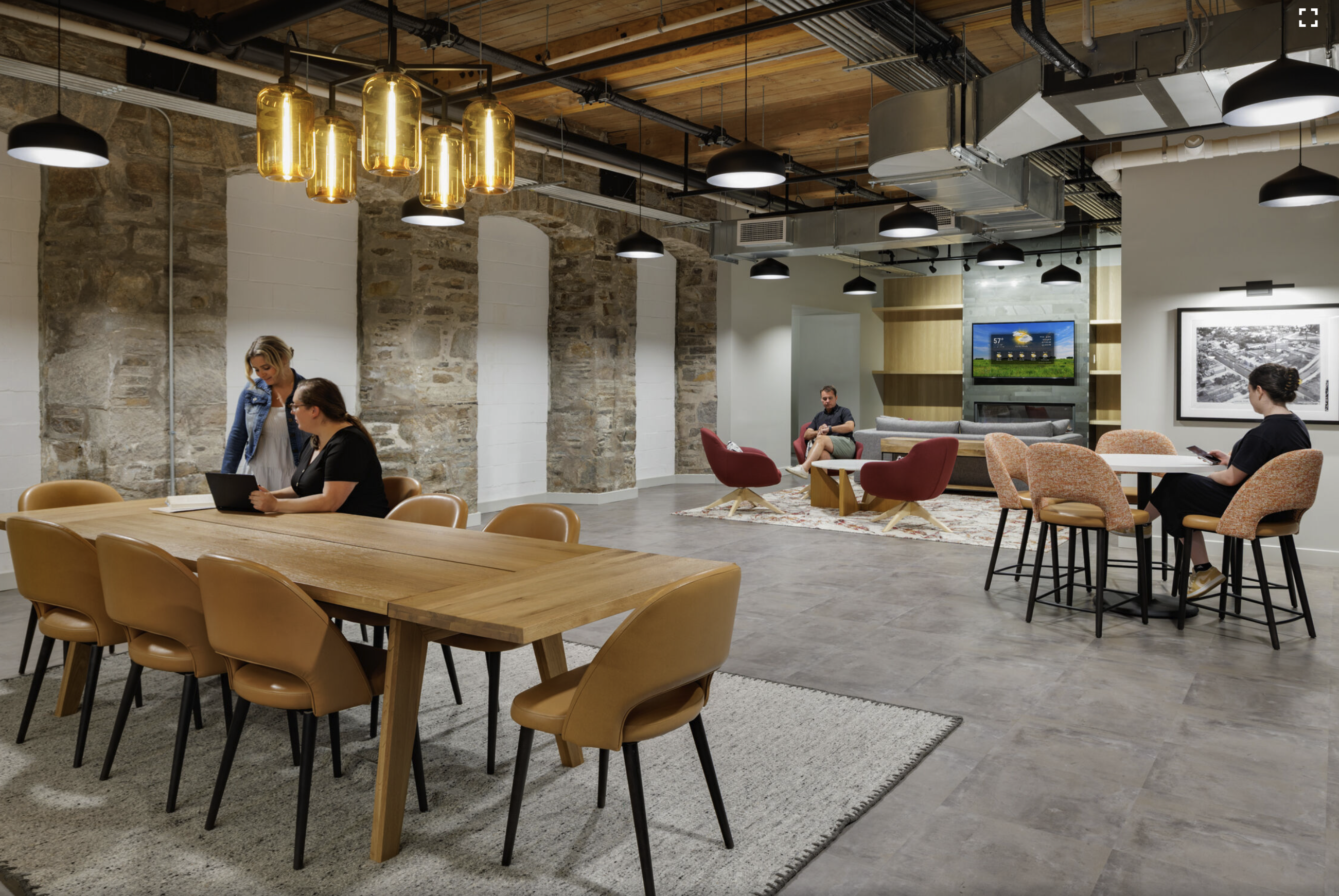
Related Stories
Adaptive Reuse | May 9, 2024
Hotels now account for over one-third of adaptive reuse projects
For the first time ever, hotel to apartment conversion projects have overtaken office-to-residential conversions.
MFPRO+ Special Reports | May 6, 2024
Top 10 trends in affordable housing
Among affordable housing developers today, there’s one commonality tying projects together: uncertainty. AEC firms share their latest insights and philosophies on the future of affordable housing in BD+C's 2023 Multifamily Annual Report.
Retail Centers | May 3, 2024
Outside Las Vegas, two unused office buildings will be turned into an open-air retail development
In Henderson, Nev., a city roughly 15 miles southeast of Las Vegas, 100,000 sf of unused office space will be turned into an open-air retail development called The Cliff. The $30 million adaptive reuse development will convert the site’s two office buildings into a destination for retail stores, chef-driven restaurants, and community entertainment.
Adaptive Reuse | Apr 29, 2024
6 characteristics of a successful adaptive reuse conversion
In the continuous battle against housing shortages and the surplus of vacant buildings, developers are turning their attention to the viability of adaptive reuse for their properties.
Mixed-Use | Apr 13, 2024
Former industrial marina gets adaptive reuse treatment
At its core, adaptive reuse is an active reimagining of the built environment in ways that serve the communities who use it. Successful adaptive reuse uncovers the latent potential in a place and uses it to meet people’s present needs.
Mixed-Use | Apr 9, 2024
A surging master-planned community in Utah gets its own entertainment district
Since its construction began two decades ago, Daybreak, the 4,100-acre master-planned community in South Jordan, Utah, has been a catalyst and model for regional growth. The latest addition is a 200-acre mixed-use entertainment district that will serve as a walkable and bikeable neighborhood within the community, anchored by a minor-league baseball park and a cinema/entertainment complex.
Adaptive Reuse | Apr 5, 2024
McHugh Construction completes restoration of Chicago’s historic Ramova Theatre
Adaptive reuse project turns 1929 cinema into a live performance venue, adds a brewery and a taproom, and revives the Ramova Grill in Chicago’s Bridgeport neighborhood.
Adaptive Reuse | Mar 30, 2024
Hotel vs. office: Different challenges in commercial to residential conversions
In the midst of a national housing shortage, developers are examining the viability of commercial to residential conversions as a solution to both problems.
Cultural Facilities | Mar 26, 2024
Renovation restores century-old Brooklyn Paramount Theater to its original use
The renovation of the iconic Brooklyn Paramount Theater restored the building to its original purpose as a movie theater and music performance venue. Long Island University had acquired the venue in the 1960s and repurposed it as the school’s basketball court.
Adaptive Reuse | Mar 26, 2024
Adaptive Reuse Scorecard released to help developers assess project viability
Lamar Johnson Collaborative announced the debut of the firm’s Adaptive Reuse Scorecard, a proprietary methodology to quickly analyze the viability of converting buildings to other uses.



